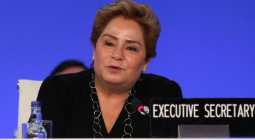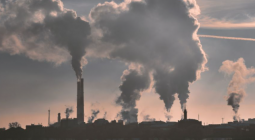Legal experts say Trump could quit Paris pact – but leaving UNFCCC much harder
As the US Senate approved the US joining the UN Framework Convention on Climate Change, it’s unclear if a president could easily pull the country out
As the US heads to the polls, Democrat Kamala Harris and Republican Donald Trump are neck and neck in the race for the White House.
While climate change has not been high on the campaign agenda, the outcome of the presidential election will have huge implications for the world’s battle to limit the damage caused by global warming, like the hurricanes Milton and Helene that hit the south-east of the US hard in the last few months.
Former President Trump has promised to take the US out of the Paris climate agreement – as he did briefly during his first term in office – and is also reported to be under pressure to pull the US out of the UN Framework Convention on Climate Change (UNFCCC) for the first time if he becomes president.
While leaving the Paris Agreement would be legally straightforward, legal experts are divided on whether Trump could withdraw the US from the UNFCCC without the approval of the US Senate and – if he did – how easy it would be for a future president to re-join.
Analysts expect either move to weaken the influence of the US in the UN climate talks, limit the country’s own action against climate change and reduce pressure on other big greenhouse-gas emitters like China to submit ambitious climate plans to the UN next year.
Exiting the Paris pact
The Trump campaign has promised to take the US out of the Paris climate agreement if he wins, joining just three other countries outside the landmark climate deal: Iran, Libya and Yemen. During Trump’s last term in office, the climate-change sceptic managed to yank the US out only briefly – for less than four months.
The agreement – which then US President Barack Obama helped negotiate in 2015 – stipulated that countries could not ask to leave for three years after it came into force in 2016. At the earliest opportunity, on November 4, 2019, the Trump administration filed a request to withdraw – but formally a year must pass between a country notifying its withdrawal from the accord and its actual exit.
The US left the Paris Agreement the day after the November 2020 presidential election was won by Democrat Joe Biden. On his first day in office – January 20, 2021 – Biden signed the papers for the US to rejoin, which it did a month later.
If elected again, this time around Trump would be able to file to quit the Paris Agreement on his first day in office and the US would leave a year later. This would mean the world’s second biggest-emitting country would no longer have to submit a national climate action plan to the United Nations every five years.
As all countries are supposed to publish an updated plan next year, however – before the US under Trump could officially leave – Washington would still be expected to submit one.
Any plan submitted by a Trump administration is likely to be far weaker than one from a Democrat-led government though – and that weakening could be contagious, particularly with regard to geopolitical rival China, the world’s carbon biggest polluter.
Li Shuo, director of the China Climate Hub at the Asia Society Policy Institute, said a potential Trump victory in November would “take off any pressure China may feel” to make its own climate action plan ambitious.
Leaving the Paris Agreement would also mean the US does not have to report on its emissions each year, and it would have weaker legal responsibilities to provide climate finance to developing countries.
UNFCCC case uncertain
Trump could go even further though in cutting ties with the UN climate process. While the Trump campaign has not clarified its position, both Politico and Bloomberg reported that lobbyists have drafted executive orders they hope to get Trump to sign which would pull the US out of both the Paris Agreement and the United Nations Framework Convention on Climate Change (UNFCCC).
The UNFCCC is the founding treaty of the UN climate talks, under which the Paris Agreement was negotiated. It was agreed at the Rio Earth Summit in 1992 and includes all countries – even the three that have not ratified the Paris pact.
Nathaniel Keohane, who was a climate adviser to former President Obama and is now head of the Center for Climate and Energy Solutions, told a webinar recently that “it would be a difference of kind – not just of degree, I think – relative to pulling out of the Paris Agreement”. Leaving the UNFCCC would “deeply harm long-term US interests”, he said, adding that while he opposed an exit from the Paris Agreement, “it was something that was more limited in its underlying, foundational aspects”.
Nonetheless, David Waskow, director of the World Resources Institute’s international climate initiative, told journalists “there are ways, even with a withdrawal, for the US or other parties to be fully engaged” – as the US has been under the UN Convention on Biodiversity which it never ratified.
Todd Stern, who was US climate envoy under Obama, told the audience at his book launch in London last week that he did not think Trump would leave the UNFCCC, and that it is unclear whether he legally could under the US constitution without the Senate’s backing.
That’s because unlike the Paris Agreement – for which Obama signed an instrument of acceptance on behalf of the US without submitting it to Congress – the UNFCCC was endorsed by the US Senate almost unanimously. The US constitution says the president has the power to make treaties “provided two thirds of the Senators present concur” – but doesn’t mention leaving treaties.
Asked if a President could leave the UNFCCC, Stern said: ““I don’t know and I don’t know if the lawyers know”.
One law professor, Dan Bodansky from Arizona State University, told Climate Home “the general consensus is that, in practice, the president can withdraw the United States from treaties to which the Senate gave advice and consent”.
The only similar previous case was in 1979, he said, when then President Jimmy Carter withdrew the US from its defence agreements with Taiwan as part of normalising relations with China. Republican Senator Barry Goldwater challenged the withdrawal in the Supreme Court whose judges were split on the matter. Four said it wasn’t a matter for the court, and one said the President could terminate treaties.
But, in practice, Yale Law School professor Harold Koh, a former legal adviser to the State Department, told Bloomberg news agency that if a president did try to leave the UNFCCC “the second they did that, it would be litigated and it would go on for a couple of years”.
There’s also uncertainty among experts about whether a future president could rejoin the climate convention without the backing of two-thirds of the Senate. Signing up for the first time required that, but the original Senate backing in 1992 could be enough to enable re-entry.
UNFCCC budget squeeze
If Trump does pull the US out, Stockholm Environment Institute researcher Richard Klein said that “one of the most direct effects will be on the UNFCCC’s budget”.
The US currently contributes about a fifth of the Bonn-based organisation’s budget. It is already low on funds this year, forcing it to make cut-backs while taking on ever-greater responsibilities in the world’s effort to tackle climate change. With the US out, China would become the UNFCCC’s biggest funder.
A US exit would also change COP climate summits. COP stands for “Conference of the Parties” to the UNFCCC – and if the US left only the Paris Agreement, it would still be a party to the UNFCCC.
But if it left the UNFCCC, it would no longer be a party and become just an observer – the same category as business lobbyists and climate campaigners. As such, US officials would be barred from officially participating in negotiations on issues such as how to respond to the global assessment of climate action due at COP33 in 2028 – and placed lower down the pecking order in terms of making speeches.
Keohane said quitting the UN convention “would sort of tie both hands behind the back of the USA in terms of its ability to shape and inform the basic conversations going on within the [UNFCCC] and the COP”.
Cover photo: US President Donald Trump arriving at the World Economic Forum in Davos (Photo: World Economic Forum/Mattias Nutt/Flickr)




